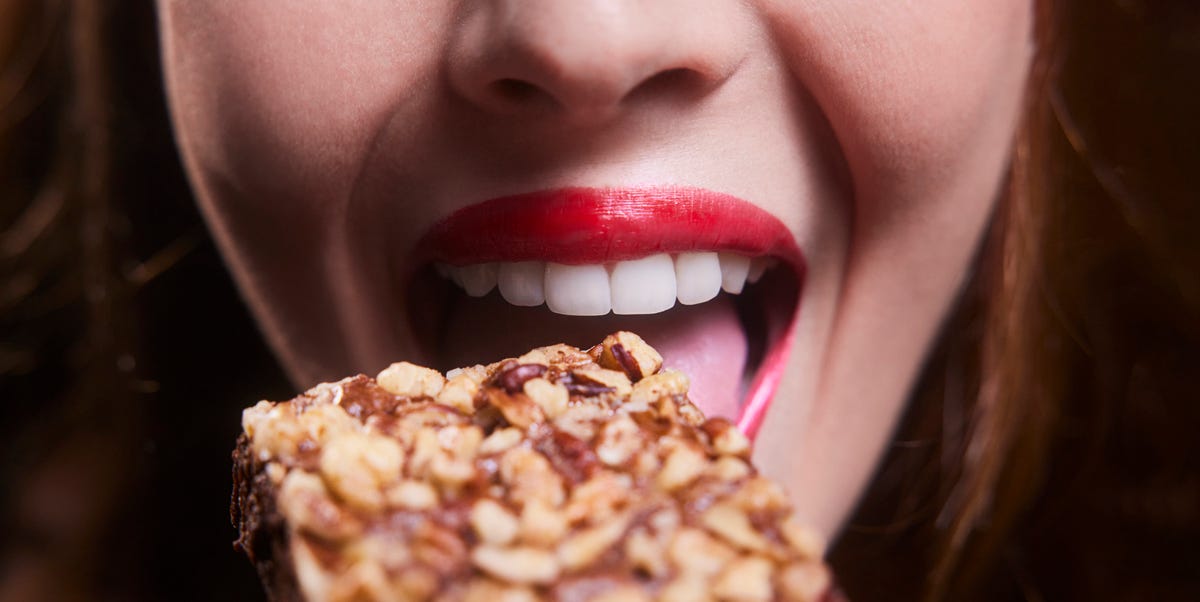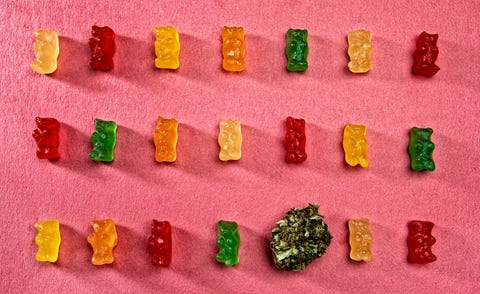
Cannabis-based foods are commonly referred to as edibles. Historically edible fans would have to experiment with whipping up party snacks at home, but these days it's easy to purchase THC and CBD edibles ready-made online or from head shops in many different forms, including lollipops, gummies, brownies, chocolates, oils and butters.
The most prominent active ingredients in the cannabis plant are the cannabinoids CBD and THC. Depending on the laws of the country you live in, edibles may contain one or both of these ingredients. In the UK, CBD is legal but THC is not - except for medicinal cannabis, which requires a prescription and doctors are still wary of prescribing it.
To find out more about edibles of all varieties – legal and otherwise – Healthspan medical director Dr Sarah Brewer and chiropractor Dr Luke McCabe explain how long edibles take to kick in and share advice on dosage, duration and side effects:
The difference between CBD and THC edibles
CBD (cannabidiol) and THC (tetrahydrocannabinol) both interact with your body's endocannabinoid system, and share many of the same medical benefits. However, they produce markedly different mental effects. THC produces a sense of euphoria described as feeling 'high', whereas CBD doesn't.
The biggest difference between THC and CBD is there's no high with CBD.
'The biggest difference between THC and CBD is there's no high with CBD,' Dr McCabe explains. 'One of the biggest side effects or downfalls of THC for most people is there's paranoia or a psychotic effect that can come with that. [CBD] allows the user to have the powerful benefits both can offer, but without the high.'
CBD edibles are commonplace in the UK and prescribing THC-based products for medicinal use has been legal since November 2018. Interestingly, medical marijuana users are more likely to consume edibles than recreational users, a US survey by RAND Corporation found.
How long do edibles take to kick in?
As a rule of thumb, both CBD and THC edibles take between 30 and 60 minutes to kick in. However, this time period can vary depending on several different factors, such as:
The type of edibles you're consuming
Sublingual products, like lollipops, lozenges and drops, dissolve in your mouth, which means the active ingredients are absorbed into your bloodstream quickly. Chewable edibles – like brownies and gummies – are broken down in your digestive tract and the active ingredients are metabolised by your liver. 'This means there is a delay of 30 to 90 minutes after swallowing a dose before noticeable effects occur,' says Dr Brewer.
The concentration and type of cannabinoids
The more potent the dose, the quicker you're likely to feel the effects. However, since CBD products don't elicit a 'high', it may be harder to identify when they have taken effect. 'The maximum effect usually occurs two to three hours after swallowing CBD, with effects lasting for around three to fiver hours, and up to 12 hours depending on the dose,' says Dr Brewer. 'A higher starting dose means the effects will last for longer.'
Your lifestyle habits
Whether you're currently taking any medication, for example, and also what you've recently eaten – both CBD and THC are fat-soluble. 'Because CBD dissolves in fat rather than water, it's a good idea to take your CBD with a high-fat meal if you are taking it via drops or capsules, as this boosts absorption by as much as five times,' says Dr Brewer.
Your physical attributes
Your weight and height influence the absorption of edibles, too. 'There are personal differences in how we metabolise and respond to CBD based on our genes,' says Dr Brewer. 'People of greater weight may need higher doses to reach an equilibrium throughout the body, especially as CBD is fat-soluble and will pass into fat stores.'

skodonnell
How long do edibles last?
Edibles generally last between six and eight hours, though again, this depends on factors such as the concentration of the cannabinoids, the potency and type of edibles – chewable edibles typically last longer than sublingual edibles – and individual factors, such as metabolism, recent meals and your personal tolerance. Generally, the effects of both THC and CBD edibles can be expected to reach their peak at around three hours.
Edibles generally last between 6-8 hours, though this depends on concentration, potency and type.
With THC-based edibles, this latency often results in that all-too-familiar trope: not feeling any effects, consuming more edibles, and accidentally overdosing. Nobody has ever died from overdosing on THC, but it's possible to have a bad reaction and experience side effects like severe confusion, anxiety, paranoia, hallucinations and vomiting. That's why you should always wait at least 24 hours before taking another dose.
Edibles dosage advice
Most over-the-counter edible products identify how much CBD (or THC) is in each serving, although you should always read the label before consuming. For some products, the serving size might refer to the entire product, and for others, only a portion. It's worth bearing in mind that the labels of non-prescription edibles may be inaccurate, so start with a low dose and work your way up.
You also need to account for the delivery method in your dosage. When you eat chewable CBD edibles, 'only 13% to 19% of an ingested dose "survives" to reach the rest of your body,' says Dr Brewer, 'so you need a higher dose than when absorbing CBD straight into the bloodstream by holding it under your tongue.' By contrast, when CBD is taken sublingually, up to 35% will reach the bloodstream, she says.
THC edibles, meanwhile, produce far more potent effects than smoking marijuana. The effects of consuming 1 mg of THC through edibles is comparable to inhaling 5.71 mg of THC, a study by the Colorado Department of Revenue concluded. Individual tolerance to THC also plays a part. A 5 mg dose will likely produce strong psychoactive effects for those with no tolerance, but for those who regularly consume THC, it will produce only mild effects.
• CBD edibles
A standard dose in CBD gummies is around 5 milligrams (mg) per gummy, which is a good starting point. 'Give it an hour – if no effects are felt at a dose of 5mg or 10mg CBD, then take another dose and hold it in your mouth to maximise absorption,' says Dr Brewer. 'The FSA recommends not taking more than 70 mg CBD per day, normally in divided doses.'
• THC edibles
As for THC? 'This can be dependent on tolerance and previous use,' says Dr McCabe. 'Mild psychoactive effects start at about 2-3 mg, with reported feelings similar to one or two alcoholic drinks. A much stronger psychoactive effect can be felt from 5-10 mg.' Doses exceeding 20 mg increase your risk of negative side effects, including dependency.
Edible side effects
Potential edible side effects vary depending on the type. Adverse effects are relatively uncommon for CBD edibles. In an online survey of 2,409 people, only minor complaints were reported, says Dr Brewer – such as dry mouth, when used as oral spray or drops (11.1%), euphoria (6.4%), hunger (6.4%), red eyes (2.7%) and feeling sleepy (1.8%).
'There is no certainty about the quality of CBD products used by those taking part in the survey, however, and some may have contained unlabelled amounts of THC or other substances that produced these effects – for example, euphoria and hunger are more usually associated with THC than with CBD,' she says. 'Even so, no serious side effects were noted.'
If you have a medical condition or are taking any prescribed medicines, always check for drug interactions.
High doses of THC edibles can produce severe symptoms, 'from paranoia, nausea, hallucinations, panic attacks and impaired mobility, to impaired athletic performance, poor muscle growth and a negative effect on hormones,' says Dr McCabe. 'Interestingly, taking CBD in conjunction with THC can alleviate some of the psychoactive effects.'
It's worth bearing in mind that edibles can interact with alcohol and certain medications, such as blood thinners. If you have a medical condition or are taking any prescribed medicines, always check with a doctor or pharmacist for drug interactions.
Benefits of edibles
People who take medicinal cannabis often prefer to consume edibles rather than smoke marijuana because of the benefits associated with this method, which include:
Lung-safe
Like tobacco smoke, marijuana smoke irritates the throat and lungs and is also carcinogenic. Regular marijuana smoking is associated with respiratory conditions like chronic bronchitis. Edibles don't carry this same risk.
Long-lasting
The effects of edibles can be felt longer than smoking or vaping marijuana, which is ideal for people who want lasting relief from symptoms without having to continually take doses throughout the day.
Convenient
Consuming edibles is straightforward. They don't require any paraphernalia, such as grinders and rolling paper, and you don't need to go outside to try them.
Inconspicuous
Marijuana smoke has a distinct, pungent smell. Consuming edibles is more discreet, which may be helpful for people who prefer to be inconspicuous about their consumption.
For more advice on purchasing and consuming edibles visit High & Polite, a UK-based website with up to date news and information on all things cannabis.
Last updated: 26-04-2021
This content is created and maintained by a third party, and imported onto this page to help users provide their email addresses. You may be able to find more information about this and similar content at piano.io